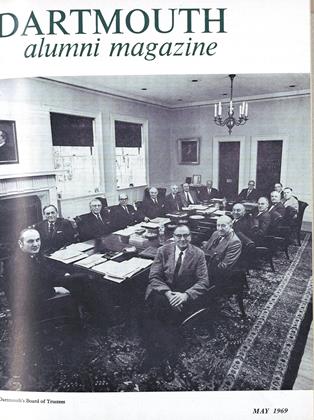Through the generosity of Kenneth F. Montgomery '25 and funds made available by the Kenneth F. Montgomery Foundation, the Dartmouth College Library has published an 87-page paperback with 1150 entries, The Health of the Eskimoes, A Bibliography 1857-1967, compiled by Robert Fortuine, M.D. The list has been compiled and arranged primarily to assist clinicians, medical scientists, and public health administrators dealing directly with the complex health problems of the North. For the most part, only writings by physicians, nurses, medical scientists, and anthropologists are listed. Eskimo diseases differ from those of the general population of North America because of their geographical isolation in a cold climate, their housing, subsistence activities, diet, and intimate contact with animals. As individuals and in communities, Eskimos suffer from a high incidence of infectious diseases with devastating results but they are seldom afflicted with diabetes and coronary arteriosclerosis.
Donald L. Burnham '44, M.D., Research Psychiatrist at the National Institute of Mental Health, Bethesda, Md., is co-author with Arthur I. Gladstone and Robert W. Gibson of Schizophrenia and the Need-FearDilemma, published by the Universities Press, Inc., New York, at $12. In the introduction, Robert A. Cohen, M.D., Director of Clinical Investigations at the Institute, writes, "The authors do not look upon the schizophrenic person as a deteriorated individual cut off from others by an autistic barrier and out of touch with reality. Instead they have tried to define the possible nature of the defect and have viewed many of the 'symptoms' as adaptive efforts the patient makes in his attempt to organize his world." The theory of the need-fear dilemma postulates that disordered object-relations in infancy and childhood may interfere to such a degree with normal developmental processes of differentiation and integration that the person is seriously predisposed to schizophrenic disorganization. Such a victim manifests three major deficiencies in personality: (1) a weak and easily disorganized ego limiting purposeful behavior; (2) a lack of autonomy; (3) an incapacity to construct reliable representations of reality. Several chapters treat the problems of a schizophrenic patient's relations with hospital staff members and his adaption to a hospital as a social system.
Edited by Maurice Mandelbaum '29, Andrew W. Mellon Professor of Philosophy at Johns Hopkins University, and by Edward N. Lee, Associate Professor of Philosophy at the University of Texas, Phenomenology and Existentialism now appears in paperback at $2.45, published by The Johns Hopkins Press. With one exception, the collected essays were first presented in 1966 at Johns Hopkins University as a moderately advanced introduction to the contemporary movements of Phenomenology and Existentialism. In an approach basically historical, the ten essays focus in sequence upon main figures and topics to provide a selective overview of main themes.
 View Full Issue
View Full Issue
More From This Issue
-
 Feature
FeatureMutual Sensitivity Wins the Day
May 1969 By JOHN DICKEY -
 Feature
FeatureWebster and the Court
May 1969 By THE HONORABLE EARL WARREN -
 Feature
FeatureWarner's 41 Dramatic Years
May 1969 By MARGARET BECK McCALLUM -
 Feature
FeatureMay 17 Event to Salute Eleazar's Starting Point
May 1969 -
 Books
BooksERNEST HEMINGWAY: A LIFE STORY
May 1969 By JEFFREY HART '51 -
 Article
ArticleThe Undergraduate Chair
May 1969 By CHRIS KERN '69
J.H.
Books
-
 Books
BooksPUBLICATIONS
August 1917 -
 Books
BooksETHICS IN A WORLD OF POWER: THE POLITICAL IDEAS OF FRIEDRICH MEINECKE
MARCH 1959 By ARTHUR M. WILSON -
 Books
BooksTHE ACHIEVEMENT OF RICHARD EBERHART.
MAY 1968 By J. D. O'HARA '53 -
 Books
BooksBACK WHERE I CAME FROM
April 1939 By Kenneth A. Robinson -
 Books
BooksTHE AMERICAN CAMPAIGNS OF ROCHAMBEAU'S ARMY 1780, 1781, 1782, 1783. Vol. 1. THE JOURNALS OF CLERMONT-CREVECOEUR, VERGER, AND BERTHIER. Vol. 2. ITINERARIES AND MAPS AND VIEWS.
MARCH 1973 By Louis Morton -
 Books
BooksTHE DETROIT MONEY MARKET
June 1933 By R. V. Leffler








